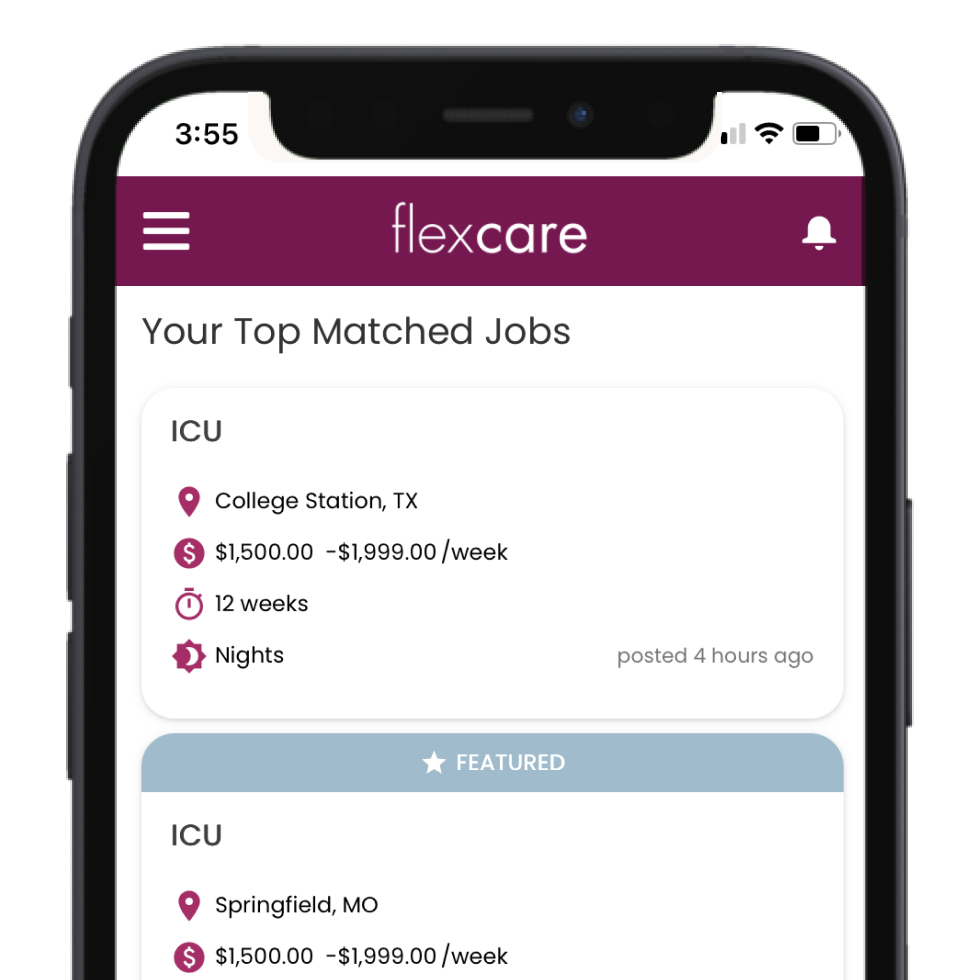How to Become a Travel Healthcare Worker
Ready for the Travel Life? Here's Where to Start
Contact a recruiter
Starting a travel healthcare career doesn’t have to be overwhelming. You don’t need to have it all figured out—you just need to know where to start and who’s got your back. This guide walks you through each step of the process, from getting your documents in order to landing your first assignment. And the best part? You won’t be doing it alone. Our team is here to help every step of the way.
1. Choosing the Right Travel Agency
Before you build a profile or browse jobs, find a partner who actually listens. A strong agency and recruiter won’t just match you with contracts—they’ll help you map out your goals, explain what to expect, and walk you through each step with clarity.
The right fit makes all the difference. When you team up with FlexCare, you get more than job access—you get a guide, an advocate, and someone who always has your back.
Get Matched with a FlexCare Recruiter
2. Prep Work – Licensing and Credentials
If you want the best of the best assignments, your paperwork’s has to be tight. Keep your licenses, certs, and immunizations up-to-date and in one place. Future you will thank you. Check out our compliance guide for the full breakdown.
3. Build a Profile That Works For You
Your profile is basically your first impression, so make it count!
Here’s what to include:
- Work History: Be clear and thorough with dates, roles, and facilities. Highlight what makes you unique! .
- Certs & Licenses: Keep them current and uploaded. Expired docs = missed opportunities.
- References: A couple of solid & reliable supervisor contacts go a long way.
- Bonus Skills: Call our experience with Epic, Cerner, telehealth, or anything techy (cybersecurity is a huge plus).

4. Make Your Résumé Work Just as Hard as You Do
Your résumé doesn’t need to be fancy; it just needs to tell your story clearly and show why you’re the one they want on the floor.
Here’s how to make it stand out:
- Lead with your specialty: Put your current role and experience front and center, don’t make them dig for it.
- Flex your flexibility: Floating between units? Cross-trained? Say so. It shows you can adapt fast (which is major in travel).
- Add real numbers: “Managed a 6-bed ICU with zero CLABSIs in a year” hits harder than “provided patient care.”
- Use the right words: Mirror the language in the job posting. This helps your résumé get past any AI filters and impresses hiring managers.
5. Want the Good Jobs? Move Fast.
The best assignments go quick. Like, really quick. If you’re ready to roll, make sure your setup doesn’t slow you down.
Here’s how you can stay ahead of the game:
- Have we mentioned the FlexCare app? It’s your job search shortcut.
- Text or call your recruiter ASAP: The best recruiter-traveler relationships are a two-way street! Don’t wait for them to reach out.
- Complete your profile: No halfway info. The more complete it is, the faster things move. And in travel healthcare, time is money. Literally.

6. Nail the Interview
Interviews for travelers are quick, so be ready to hit the important stuff and make a solid impression.
Here’s how to make it stand out:
- Lead with your specialty: Put your current role and experience front and center, don’t make them dig for it.
- Flex your flexibility: Floating between units? Cross-trained? Say so. It shows you can adapt fast (which is major in travel).
- Add real numbers: “Managed a 6-bed ICU with zero CLABSIs in a year” hits harder than “provided patient care.”
- Use the right words: Mirror the language in the job posting. This helps your résumé get past any AI filters and impresses hiring managers.
7. Orientation’s Quick. You Can Be Quicker.
Orientation for travelers isn’t a slow stroll, it’s a sprint. Be ready to roll from the jump.
Here’s how to set yourself up for a smooth start:
- Make sure your EMR access is good to go: Don’t wait until you’re at the nurses’ station to find out you’re locked out.
- Bring your (fully charged!) laptop: You’ll probably need it for modules or onboarding paperwork.
- Block off time to finish your e-learning: Evenings will be your best bet; don’t leave it until the last minute.
- Do a dry run of your commute: Seriously. It happens to the best of us, but getting lost or showing up late on day one is not the vibe.

8. First-Time Traveler? Here’s the Truth:
Starting your travel career is exciting! But it’s also a learning curve. Here’s what some of our nurses wish they knew before:
- Pack smart, not extra: You don’t need five pairs of scrubs and a panini press.
- Keep it simple. Be flexible with shifts and locations: The more open you are, the more doors open for you.
- Bringing family or pets? Plan ahead. Housing and travel logistics get trickier (but are totally doable)
- If something feels off, speak up: Don’t sit in silence. Your recruiter is there to be your advocate, so loop them in early.
9. Don’t Go It Alone. Find Your People.
Travel nursing can feel a little lonely at first, but it doesn’t have to. The key? Community. It makes the whole experience better and helps keep burnout at bay.
Here’s how to stay connected:
- Join the FlexCare family online: Follow along on Facebook, Instagram, TikTok, and LinkedIn. See real advice, some humor after a long shift, and people who get it.

- Just say yes: Whether it’s a hospital potluck, staff happy hour, or a random invite to trivia night, show up and have fun. That’s how friendships start.
- Explore like a local: Hit up the coffee shops, hiking trails, or whatever your thing is. And post it! Sharing your journey helps build your professional network and makes future job interviews easier.
10. Ready to Roll?
If you’re serious about landing a great assignment, a little elbow grease now will save you a ton of time later.
Here’s how to lock it in:
- Double-check your credentials: Make sure your compact license and certifications are current.
- Finish your profile: Add your latest references, updated skills, and shift preferences. The more complete it is, the faster recruiters can get you placed.
- Apply to at least three solid jobs a day: Casting a wide new gives you options (and leverage).
- Have your elevator pitch ready: Keep it short and strong – who you are, what you bring, and when you’re available.
- Watch pay trends: Knowing what’s competitive helps you negotiate like a pro.